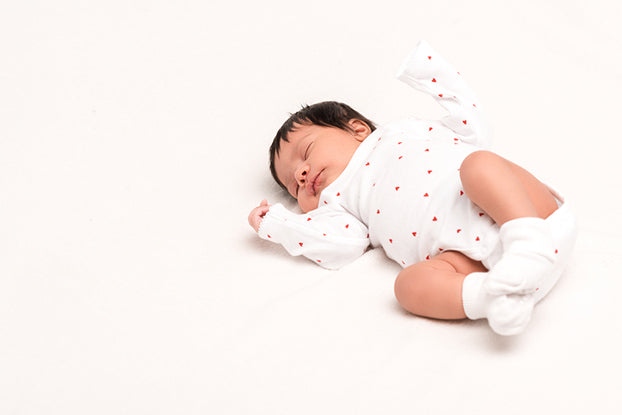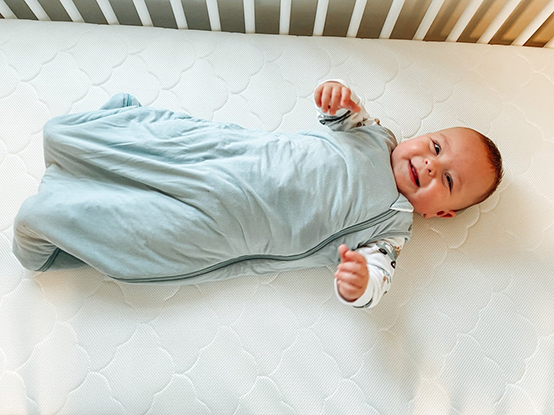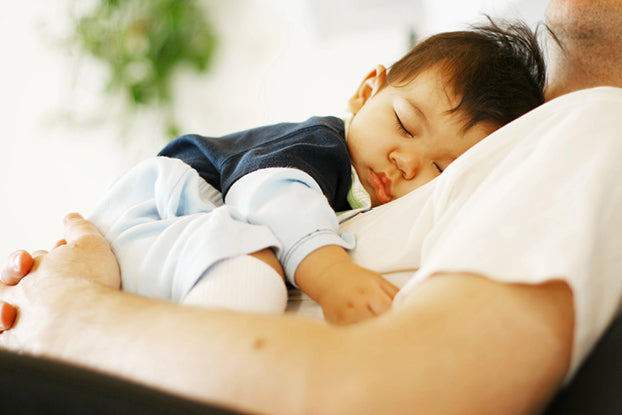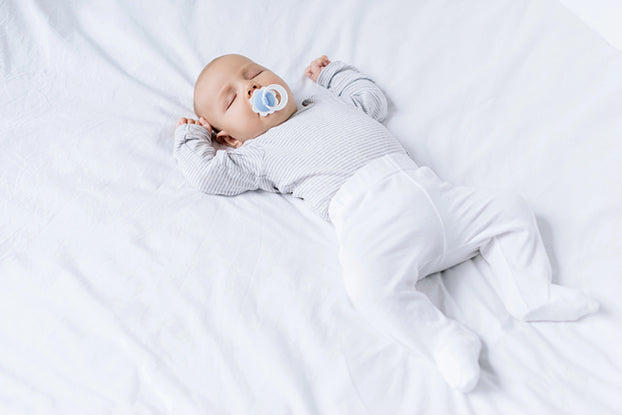Baby Grunting in Their Sleep: Why It Happens and What to Know

For many new parents, there are few things as sweet as a quiet nursery at night. But that peace can quickly be shattered by baby grunting in their sleep.
Is that normal? What causes those grunts? And is there anything to worry about?
In this article, we discuss some of the reasons why babies may grunt in their sleep, when to be concerned, and how to help your little one sleep better night after night.
Table of contents
- Why do babies grunt in their sleep?
- Should you be concerned about your baby grunting in their sleep?
- Will your baby ever stop grunting in their sleep?
- How to help your baby sleep better
Why do babies grunt in their sleep?

Before we discuss why babies grunt in their sleep, it’s important to note that many of the reasons are perfectly normal. As we’ll touch on, unless the grunting is accompanied by other symptoms, there’s really nothing to worry about.
That said, if you are at all concerned about your little one’s sleep schedule, patterns, and habits, feel free to talk with a pediatrician or other health professional.
Digestive issues
One of the main reasons that babies grunt in their sleep is digestive issues.
This type of tummy trouble isn’t really anything to be worried about, though. It’s most often just your newborn’s body learning how to coordinate muscle movement and break down breastmilk or formula.
As a result of this activity inside your baby’s body, they may grunt, gurgle, or make other noises while they sleep. Unless it’s accompanied by other signs and symptoms (which we’ll discuss in the next section), it’s a normal part of your baby growing up.
Sleep transitions
Newborn babies cycle through the various stages of sleep every 45 to 50 minutes.
Some of these stages are lighter than (or not as deep as) others which allows your little one to move around (e.g., jerk their arms, turn their head, kick their legs), wake slightly, and grunt in their sleep.
These transitions — and the grunts, noises, and movements that come with them — are nothing to worry about and are a natural part of healthy sleep patterns.
Active sleep
Your baby’s sleep is characterized by two main stages: the non-rapid eye movement (NREM or “quiet sleep”) stage and the rapid eye movement (REM or “active sleep”) stage.
Babies spend 40-50% of their sleep in the REM stage (compared to 15% for adults) which comes with rapid eye movement, twitching, and, yes, grunting.
This doesn’t mean your little one is in distress. It’s simply a different type of sleep than the quiet, still type that you probably associate with slumber.
Nasal congestion
Twelve to 16 weeks after they’re born, your little one will start to breathe through their mouth. Until then, they only breathe through their nose.
Those nasal passages are so tiny, it only takes a small bit of congestion to interrupt their sleep. Even if they don’t wake up completely, they may grunt as a way to clear their stuffy nose so they can return to breathing easily while they sleep.
Natural development
Your baby is constantly exploring, experimenting with, and learning about their body. That certainly includes their vocal cords and all the wonderful noises they can make — both while they’re awake and while they’re asleep.
Your baby grunting in their sleep may be nothing more than them trying something new or “practicing” a muscle movement or sound so they can incorporate it into their activity while awake.
Nine times out of 10, those grunts don’t have any meaning at all.
Hunger
As every new parent knows, babies are hungry a lot and will exhibit specific behaviors when they want to feed. These behaviors — rooting noises, lip-smacking, suckling, and grunting — can even come out while your little one is asleep.
If you begin to hear your baby grunting in their sleep, it could be a sign that they’re hungry and may wake up soon to feed.
Bowel movement
As we’ve mentioned already, newborns are still learning how to coordinate all their muscle movements. This is especially true for their pelvic and tummy muscles.
So, if they need to move their bowels while they sleep, they may grunt and strain to make it happen.
These sounds and movements even have a name: grunting baby syndrome. Yes, it can be nerve-wracking to watch your newborn struggle, but they’ll likely figure it all out in a week or two and calm down after that.
Should you be concerned about your baby grunting in their sleep?

Most of the time, your baby grunting in their sleep is completely normal and is nothing to worry about. But, if that grunting is accompanied by other symptoms, talk to a doctor as soon as possible.
These symptoms include:
- Labored breathing
- Fast breathing (typically over 40 breaths per minute)
- Receding chin while inhaling
- Rhythmic grunting paired with flared nostrils
- An extra-long exhale
- A whistling sound on exhale
- Fever
- Lethargy
- Increase in grunting frequency or intensity
Will your baby ever stop grunting in their sleep?
Yes, your baby will eventually stop grunting in their sleep.
First, their body will figure out how to function efficiently so their lungs, vocal cords, and digestive system will settle down into more typical activity.
Second, sometime between three and six months, your little one will start spending less time in the active REM sleep stage and more time in the quieter NREM sleep stage.
Either or both of these developmental milestones may result in a reduction — or a complete elimination — of grunting during sleep.
How to help your baby sleep better

Place baby on their back.
To help your baby sleep better, place them on their back to start.
Eventually, your little one will learn how to roll over (usually around four months old), so you may find them sleeping on their stomach or their side in the morning or if you check on them during the night.
That said, always place your baby on their back at first. The best thing you can do to ensure a good (and safe) night’s sleep is to use a firm, breathable mattress in their crib.
Clear their airways.
As we mentioned earlier, it’s very easy for your baby’s nose to become congested, which can keep them from getting the sleep they need.
You can help prevent this from happening by manually clearing their nasal passages before putting them down for the night.
Safe options include:
- Saline nasal spray
- Bulb aspirator
- Gentle, newborn-safe suction device
Be sure to check with your pediatrician on what they recommend before manually clearing your little one’s nose.
Choose a firm crib mattress.
Although you might sleep better on a fluffy bed, soft mattresses aren’t safe for babies. When it comes to choosing a crib mattress for your infant, the firmer the better.
But keep in mind that firm doesn’t have to mean rock hard and uncomfortable.
The Newton Baby Crib Mattress is the perfect combination of comfy and safe — comfortable enough to allow your little one to “sleep like a baby” but firm enough to provide a safe sleeping environment.
Keep the sleep area cool.
If your little one gets too hot, they may not sleep as deeply as they could (and grunt more in the process) or they could wake up because they either have a sweaty back or they’re uncomfortable.
To help your baby sleep better — and possibly grunt less — keep the temperature set between 68℉ and 72℉.
Setting the room to a cooler temperature (as well as using a breathable mattress!) keeps your baby’s back free from sweat and helps them stay comfortable throughout the night.
Take blankets, pillows, and toys out of the crib.
To help your little one sleep well (and, most of all, safely), take all blankets, pillows, toys, and crib bumpers out of the crib. You’ll also want to make sure the bedding isn’t too loose.
For safe bedding, choose a tight-fitting bottom sheet (and no top sheet). Consider going with a sheet that’s breathable, soft, 100% organic, and tailored to fit a standard-sized crib mattress.
While crib sheets are cute, maybe you prefer to go without one. Good news: you can with a Newton Baby mattress!
Our included mattress cover is comfy enough for your baby to sleep on. Plus, it’s completely washable, which makes for easy cleanup for you. Keep an extra cover on hand to use during laundry days and for those unexpected — yet inevitable — nighttime diaper leaks.
Rest easy with Newton Baby.

Hearing your baby grunting in their sleep can be worrisome — especially the first time it happens. Just remember that, in most cases, those noises are simply a normal part of their development and unique sleep cycle.
The best thing you can do for your newborn is keep an eye out for other symptoms and make their sleep environment as comfortable as possible with a firm, breathable mattress from Newton Baby.
Combine that with soft, organic cotton sheets (also from Newton Baby) and you’ll have the epitome of comfort and safety for newborns, toddlers, and children of all ages.
For more information on helping your baby sleep through the night and to check out our crib mattresses, sheets, pads, and swaddles, visit NewtonBaby.com today.